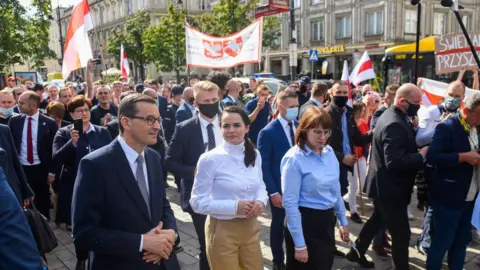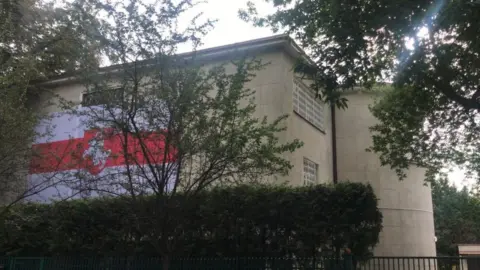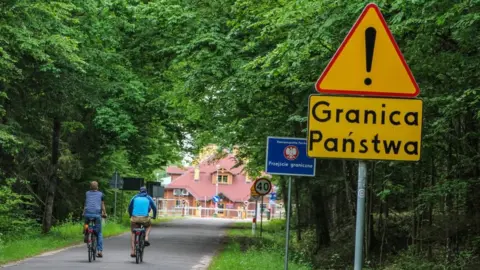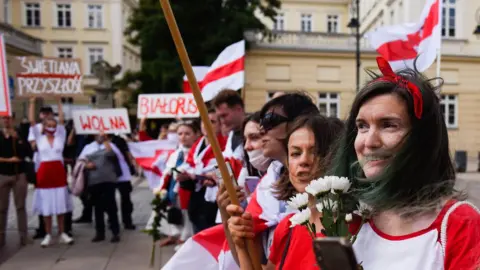Belarus protests: Why Poland is backing the opposition
 Getty Images
Getty ImagesPoland is one of the leading countries pushing the EU to take action against the authoritarian government in Belarus, after a disputed presidential election triggered massive street protests and a crackdown on the opposition.
Polish Prime Minister Mateusz Morawiecki has described recent events in the neighbouring country as a "breakthrough".
"Belarusians have not only broken through their own fear, but they have shown the whole of Europe that they want to belong to a Europe of free, democratic, nations under the rule of law," he told Polish Radio on Wednesday.
He spoke ahead of a meeting in Warsaw with the leader of the Belarusian opposition, Svetlana Tikhanovskaya, who has been forced into exile in Lithuania.
How Poland is backing the opposition
Warsaw is supporting Belarusian opposition demands for a new and fair election and has called for the release of all political prisoners.
Veronika Tsepkalo, one of three women who joined forces in the election against long-time leader Alexander Lukashenko, has subsequently found exile in Poland. So too has opposition activist Olga Kovalkova.
And Polish hospitals are treating Belarusian activists who have been injured or tortured by the authorities in Minsk.
The Polish government has also announced a 50m zloty (£10.2m; €11.2m) aid package to help the Belarusian people come to Poland to work or study.
 Dominika Pasterska
Dominika PasterskaFor years, the Polish state has been financially supporting independent Belarusian-staffed media based in Poland broadcasting to Belarusians, such as Radio Racja and Belsat TV.
The small Belarusian editorial team of Nexta TV that broadcasts user-generated content from its two million subscribers on YouTube and Telegram is also based in Warsaw.
Centuries of shared history
The reason that Poland is so interested in what's going on in Belarus is not only geographic. Poland's 400km (248-mile) long frontier with Belarus forms part of the EU's eastern external border. It is less than 200km from Warsaw.
In fact, the two nations share centuries of history that have left a substantial Polish minority in Belarus and a smaller Belarusian community in Poland. That group in Poland is expanding, thanks to increasing numbers of Belarusians seeking work.
 Getty Images
Getty ImagesSeveral 19th Century writers, including Jan Czeczot and Wincenty Dunin-Marcinkiewicz, wrote both in Polish and Belarusian.
"We were citizens of the same federal state, the Polish-Lithuanian Commonwealth, for more than four hundred years, one of whose languages was Belarusian," MEP Radoslaw Sikorski told me.
As Poland's foreign minister, he co-authored the EU's Eastern Partnership programme designed to improve the bloc's relations with six eastern European nations, including Belarus.
"It's only natural for Poland to take an interest in Belarus and there is agreement on this across the political spectrum," he said.
But is its reputation tarnished?
After Poland's Solidarity movement toppled the communist regime in 1989, Warsaw used its credibility as a country that had undergone a successful transition to support democratic change in Ukraine and Belarus.
And, after Poland joined the EU in 2004, it also sought to influence the bloc's policy towards the region.
But, according to Prof Agnieszka Bienczyk-Missala from Warsaw University, Poland's credibility with the Belarusian opposition was tarnished in 2016.
This was when Mr Morawiecki, who was then deputy prime minister, met Belarus's authoritarian leader in Minsk to try to improve economic relations between the two neighbours.
"Poland made a mistake adopting a policy of dialogue with Lukashenko that was partly a reaction to the annexation of Crimea by Russia," Prof Bienczyk-Missala said. "I think this resulted in Poland being unable to establish close links with the Belarusian opposition and Lithuania was able to do so".
She adds that Poland's credibility has been tarnished further due to its own problems with the rule of law.
 Getty Images
Getty ImagesThe European Commission and many other international organisations have criticised the governing Law and Justice (PiS) coalition's changes to Poland's judicial system over the past five years, saying they undermine its independence.
The Polish presidential run-off in July that saw PiS ally Andrzej Duda re-elected was well run, the OSCE's Office for Democratic Institutions and Human Rights said, but biased coverage by the public broadcaster in support of Mr Duda tarnished the election.
"Do we have the moral authority in criticising another country's election?" Mr Sikorski said.
"We used to be a democratic mecca and now we're being pilloried for breaches of the rule of law," he added. "We've squandered some of the political capital we used to have."
